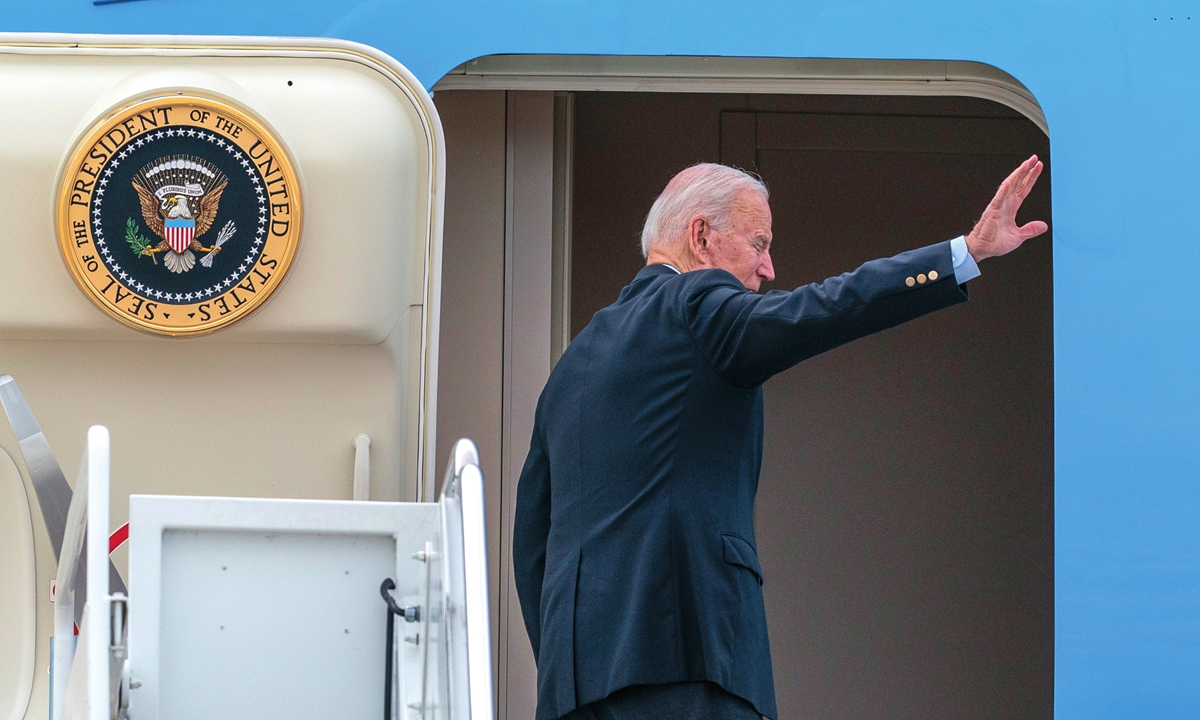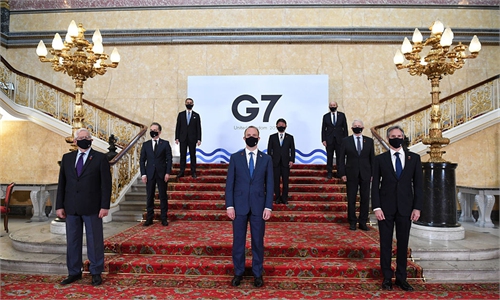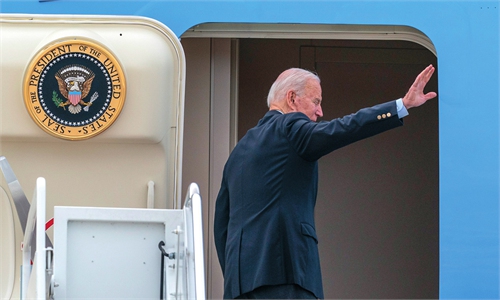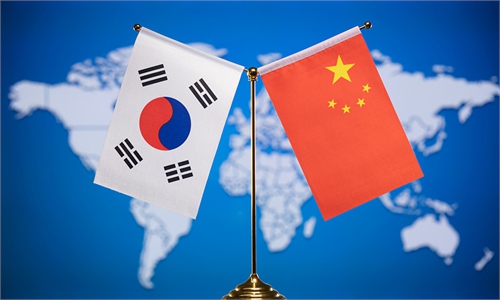
US President Joe Biden waves as he boards Air Force One on Wednesday at Andrews Air Force Base. Biden is embarking on the first overseas trip of his term, and is eager to reassert the US on the world stage, steadying European allies deeply shaken by his predecessor Donald Trump. Photo: AP
After touching down in Europe on Wednesday, US President Joe Biden will attend the G7 summit, the NATO summit, and the EU-US summit during this very first foreign trip of his time in office. The tour is widely acknowledged as a big step for the US to showcase "America is back," which Biden proclaimed in his first foreign policy speech in February. Yet numerous analyses have shown the focus of the tour will ultimately be about China.
"The issue of China will be woven throughout every single meeting on his agenda," the South China Morning Post quoted former US defense official Barry Pavel as saying on Wednesday. Even Biden himself signaled the same in his article "My trip to Europe is about America rallying the world's democracies," published on the Washington Post on Sunday. He stressed, "We will focus on ensuring that market democracies, not China or anyone else, write the 21st-century rules around trade and technology."
It can be argued that the Biden administration's campaign to "restore America's place in the world" actually means doubling down on a zero-sum competition with China.
"Our relationship with China will be competitive when it should be, collaborative when it can be, adversarial when it must be." This is how US Secretary of State Antony Blinken described the nature of the bilateral ties in March. Yet it is more like an empty slogan. The room for cooperation the Biden administration is willing to carry out with China is very limited. It wants to place such cooperation under US dominance, such as on climate change. In certain fields, the current administration is even tougher on containing China than Trump's team.
After four years of Trump presidency, Washington's allies wonder whether they can trust American leadership again. The truth is, Washington itself is not so sure either. But it shouts it out loud any way. The method the Biden administration is adopting to regain leadership is not providing global public goods generously - like what a real super power is supposed to do. It is instead uniting its allies by creating a common enemy: China.
This tactic does have some effects. It has made an increasing number of European countries more vigilant against China, which is reflected in their attitudes toward the Confucius Institutes and the 5G technology of Chinese tech giant Huawei.
But at the same time, EU countries are not willing to be totally led by the nose by Washington. For instance, Washington has been playing the ideological card hard lately. Biden's initiative to build an alliance of democracy is part of the strategy. But it may result in a new cold war. European countries, which were direct victims of the Cold War, are sensitive and resistant to be dragged into a similar confrontation again. And they are not interested in Washington's appeal to decouple with China either. After all, decoupling would badly hurt their national interests.
There are differences in other areas too. For example, the Biden administration maintained Trump's travel ban for European citizens and imposed tariffs on EU-made goods. It is also reported that the G7 has planned to launch a "Clean Green Initiative" as an alternative to the China-proposed Belt and Road Initiative (BRI). The program will be difficult to promote, because G7 members will consider naturally their own gains and losses regarding specific investments. Due to the impact of COVID-19, G7 countries are suffering from sluggish economy, so they can barely put up more money to help improve infrastructure construction in developing countries. Therefore, the alternative is more like a publicity stunt, a way to put more pressure on China.
When Biden clamors that "America is back," he wants to show his differences from Trump. However, if Washington really wants to become a genuine global leader, it must provide global public goods to countries worldwide with different economic structures and social conditions. Unfortunately, Washington has been very reserved in providing COVID-19 vaccines to help other countries, including its allies, even if it has more than enough stocks of vaccines. During his campaign, Biden said the US should accept as many as 125,000 refugees per year. But in May, he changed the ceiling for refugee admissions, fixed the number to 62,500, blatantly going against his promises.
Although Biden tries to be different from Trump, his acts are still in line with the Trump doctrine of "America First." In fact, "America First" has long been the US diplomatic tradition. The Biden administration will maintain the selfishness of the "America First" posture without contributing to or considering other countries' interests.
US allies are not fools. The US cannot use empty talk without real solutions to return to its position as a so-called world leader. To a great extent, Washington's allies have already doubted US role. They believe the US is unreliable and unpredictable, and are considering how to maintain the stability of the international landscape and their own development without a global leader.
The article was compiled by Global Times reporter based on an interview with Liu Weidong, a research fellow at the Institute of American Studies at the Chinese Academy of Social Sciences. opinion@globaltimes.com.cn



